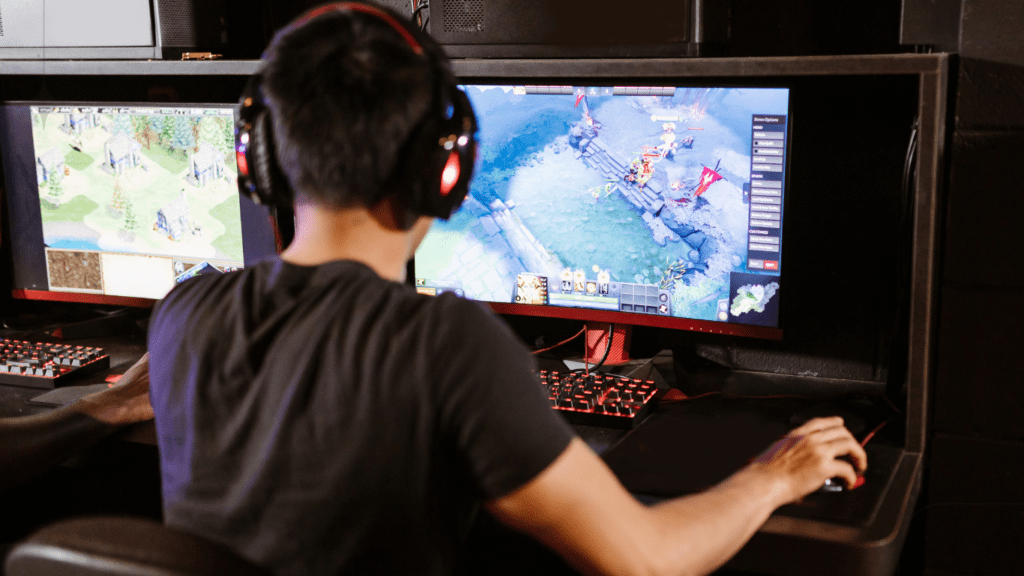As a passionate advocate for both esports and traditional sports, I’ve always been fascinated by the unique dynamics and similarities between these two worlds. Exploring the realm of competitive gaming alongside the time-honored traditions of physical sports reveals a rich tapestry of contrasts and connections that shape the landscape of modern sports entertainment. From the adrenaline-pumping moments of a last-second victory to the strategic depth required for success, esports and traditional sports share a common goal: to captivate audiences and showcase the pinnacle of human skill and athleticism.
In this article, I’ll delve into the intriguing parallels and distinctions between esports and traditional sports, shedding light on how both spheres continue to evolve and intersect in today’s sports culture. Whether you’re a die-hard fan of esports or a loyal follower of traditional sports, understanding the nuances of each domain can offer a fresh perspective on the ever-changing world of competitive athletics. Let’s embark on a journey to uncover the essence of competition that unites these seemingly disparate realms.
Esports vs. Traditional Sports: Exploring the Landscape
As I delve into the comparison between esports and traditional sports, I uncover fascinating insights into their unique yet interconnected worlds. Understanding the distinct characteristics of each discipline sheds light on the evolution and intersection of these two prominent sectors within the realm of competitive athletics. Let’s explore the landscape and dissect the similarities and differences that define esports and traditional sports.
Growth Trajectory:
In comparing esports with traditional sports, one can’t overlook the exponential growth trajectory of competitive gaming. While traditional sports have centuries of rich history, esports have rapidly gained momentum in recent decades, driven by technological advancements and global connectivity. This dynamic progression highlights the ever-evolving nature of sports and entertainment industries, where esports now stand as a formidable competitor to their traditional counterparts.
Audience Engagement:
The landscape of esports and traditional sports is further distinguished by audience engagement dynamics. Esports appeal to a predominantly tech-savvy demographic, harnessing the power of digital platforms to reach global audiences in real-time. In contrast, traditional sports often rely on broadcast networks and physical venues to engage fans, offering a more tangible and immersive experience. The shifting preferences of audiences reflect the diverse viewing habits and interactive opportunities presented by both mediums.
Skillset and Strategy:
When dissecting the core elements of esports and traditional sports, the nuances of skillset and strategy come to the forefront. Esports demand a unique blend of cognitive abilities, reflexes, and teamwork, leveraging digital interfaces and virtual environments to showcase player prowess. Traditional sports, on the other hand, emphasize physical endurance, technique, and tactical execution on the field or court. The convergence of these skillsets underscores the multifaceted nature of competitive athletics, transcending traditional boundaries and redefining the meaning of sportsmanship.
Competitive Structure:
The competitive structure of esports and traditional sports unveils contrasting yet complementary frameworks. Esports tournaments follow a structured format of leagues, seasons, and championships, often incorporating online qualifiers and live events to determine top performers. In comparison, traditional sports adhere to established sports associations, governing bodies, and global competitions that uphold sporting traditions and regulations. Despite these differences, both realms underscore the essence of competition, fostering a spirit of sportsmanship and excellence among athletes and enthusiasts alike.
Understanding Esports
Esports, short for electronic sports, are competitive video gaming events where individuals or teams compete against each other in various video games. It’s a rapidly growing industry that has gained immense popularity globally.
What Are Esports?
Esports involve professional gamers competing in organized competitions and tournaments, often with substantial prize pools. These events are live-streamed to audiences worldwide, attracting millions of viewers who tune in to watch their favorite players or teams in action.
Growth and Popularity
Esports has experienced exponential growth over the past few years, with an ever-expanding fan base and increasing investment from sponsors and media companies. The accessibility of online streaming platforms has played a significant role in the rise of esports, allowing fans to follow competitions in real-time from anywhere in the world. Tournaments such as The International for Dota 2 and the League of Legends World Championship have become major events in the esports calendar, drawing massive viewership and rivaling traditional sports broadcasts.
Understanding Traditional Sports

Traditional sports have deep-rooted historical significance and play a vital role in global culture. They encompass a wide range of physical activities organized into competitive events, showcasing athletes’ skills and athleticism to a live audience.
- Historical Context
Traditional sports have evolved over centuries, with each sport having its unique origin story. From ancient civilizations to modern times, sports have been a unifying force, bringing communities together and fostering a sense of camaraderie among participants. - Global Influence
The impact of traditional sports transcends borders, resonating with people of diverse backgrounds worldwide. Major sporting events like the Olympics and FIFA World Cup attract billions of viewers, uniting nations in a shared passion for athletic achievement. Traditional sports serve as a platform for cultural exchange and promote mutual understanding among nations.
Key Similarities Between Esports and Traditional Sports
In both Esports and Traditional Sports, the competitive nature is a significant driving force. Players in both arenas strive for excellence, honing their skills through practice and dedication to outperform their opponents. Skill, strategy, and teamwork are crucial elements that contribute to success in both Esports and Traditional Sports.
Competitive Nature
In Esports, just like in Traditional Sports, competition is fierce. Players in Esports teams or individually compete in organized tournaments, aiming to claim victory and earn prestigious titles. The thrill of competition, the pursuit of excellence, and the drive to win are universal aspects shared by Esports and Traditional Sports.
Fan Engagement
Fan engagement plays a vital role in both Esports and Traditional Sports. Supporters of Esports teams or individual players, as well as fans of Traditional Sports teams, show unwavering dedication and passion for their favorites. They follow matches, attend events, and cheer enthusiastically, creating a vibrant and interactive community around the sports they love. The connection between fans and players is a common thread that unites Esports and Traditional Sports, making both experiences immensely enjoyable and memorable for enthusiasts worldwide.
Key Differences Between Esports and Traditional Sports
When comparing esports and traditional sports, there are key differences that set them apart. These differences impact various aspects of each category, from accessibility to the type of skills required. Let’s delve into these disparities to gain a better understanding of how esports and traditional sports differ fundamentally.
Accessibility and Inclusivity
In terms of accessibility and inclusivity, esports hold a significant advantage over traditional sports. Unlike traditional sports that often require specific physical attributes or access to expensive equipment and facilities, esports only require a gaming setup which is relatively affordable and accessible to a broader population. This accessibility has allowed individuals from diverse backgrounds to participate in and enjoy esports, leveling the playing field for everyone involved.
Type of Skills Required
The type of skills demanded in esports differs from those in traditional sports. While traditional sports emphasize physical prowess, agility, and endurance, esports prioritize cognitive abilities, quick reflexes, strategic thinking, and adaptability. Esports players must excel in hand-eye coordination, decision-making under pressure, and the ability to strategize effectively in dynamic environments. These cognitive skills are fundamental to success in esports competitions, distinguishing them from the physical attributes essential in traditional sports.
Impact on Society
Esports and traditional sports have profound impacts on society, influencing various aspects of culture, economy, and community dynamics.
Economic Impact
In terms of economic impact, both esports and traditional sports contribute significantly to various industries. Esports, with its growing popularity and massive viewership, has become a lucrative market for sponsors, advertisers, and media companies. Tournaments like The International and League of Legends World Championship generate substantial revenue through sponsorships, ticket sales, and broadcast rights, boosting the overall economy. Similarly, traditional sports events such as the Olympics and FIFA World Cup attract billions of viewers worldwide, driving revenue through merchandise sales, broadcasting deals, and tourism.
Cultural Significance
Both esports and traditional sports hold immense cultural significance, serving as platforms for unity, diversity, and identity formation. Esports, with its global reach and diverse player base, has created a unique subculture that transcends geographical boundaries, bringing together individuals from different backgrounds through a shared love for gaming. On the other hand, traditional sports, deeply rooted in history and tradition, play a crucial role in shaping national identities and fostering a sense of pride and belonging among fans. Events like the Super Bowl and the World Series symbolize cultural heritage, promoting values of teamwork, determination, and sportsmanship across generations.

 David Fields is a dedicated contributor to Jackpot Joyfully, specializing in the intricacies of sports betting and casino games. With years of experience in the gaming industry, David provides readers with expert advice, detailed strategies, and the latest insights to help them make informed decisions. His commitment to fostering a fun yet responsible gaming environment shines through in every article he writes, making him a trusted voice for both new and experienced players.
David Fields is a dedicated contributor to Jackpot Joyfully, specializing in the intricacies of sports betting and casino games. With years of experience in the gaming industry, David provides readers with expert advice, detailed strategies, and the latest insights to help them make informed decisions. His commitment to fostering a fun yet responsible gaming environment shines through in every article he writes, making him a trusted voice for both new and experienced players.

